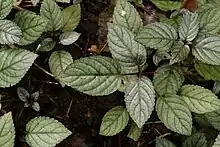Strobilanthes alternata
Strobilanthes alternata (synonym Hemigraphis alternata), may be known as red ivy, red-flame ivy, or waffle plant, is a member of the family Acanthaceae native to Java.[1] It is a prostrate plant with purple colored leaves.
| Strobilanthes alternata | |
|---|---|
 | |
| Scientific classification | |
| Kingdom: | Plantae |
| Clade: | Tracheophytes |
| Clade: | Angiosperms |
| Clade: | Eudicots |
| Clade: | Asterids |
| Order: | Lamiales |
| Family: | Acanthaceae |
| Genus: | Strobilanthes |
| Species: | S. alternata |
| Binomial name | |
| Strobilanthes alternata (Burm.f.) Moylan ex J.R.I.Wood | |
| Synonyms | |
| |
Description
Strobilanthes alternata is a herbaceous plant that reaches approximately 30 cm (12 in) in length. The stems of the plant are prostrate and purplish, especially at the nodes. The leaves, which are covered in fine hairs, are arranged oppositely on the stem with one leaf noticeably larger than its counterpart. The leaf blades are dark green on the top face and are lighter green or purplish on the lower face. Commonly known as the Cemetery plant, Purple waffle plant, or Murikooti, it is referred to in Ayurvedic medicine as Vranaropani, which translates to "wound healer". In Kerala, India, the local name for this herb is Muriyan pacha, a name related to belief in its wound-healing properties. This plant is native to the tropical regions of the globe especially tropical Malaysia and South East Asia. This natural herb grows in plenty across India, China, Indonesia, and Japan[2]
Uses
In Indonesia, Strobilanthes alternata is used to promote urination, check and heal hemorrhages, stop dysentery, and treat venereal diseases.[2]
The plant is popular in the United States and rarely the United Kingdom to use in hanging baskets for gardens.The botanical name of Red flame ivy is Hemigraphis colorata Blume.[3]
References
- "GlobinMed – A unique interactive e-database with validated, up-to-date and comprehensive information on Integrated Medicine".
- Christophe Wiart (2006). Medicinal Plants of the Asia-Pacific: Drugs for the Future?. World Scientific. p. 553. ISBN 9789814480338.
- D. G. Hessayon (1996). The House Plant Expert (illustrated ed.). Sterling Publishing Company, Inc. p. 157. ISBN 9780903505352.
 Media related to Strobilanthes alternata at Wikimedia Commons
Media related to Strobilanthes alternata at Wikimedia Commons